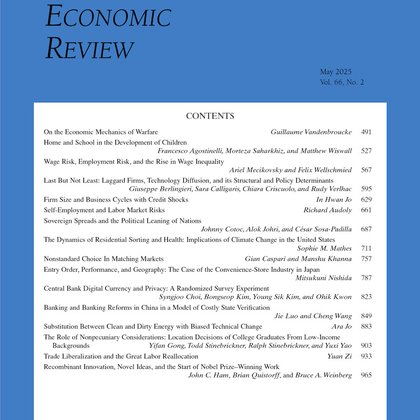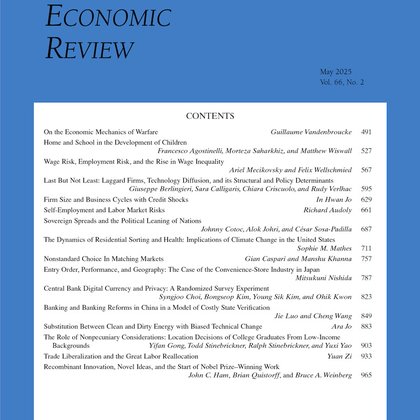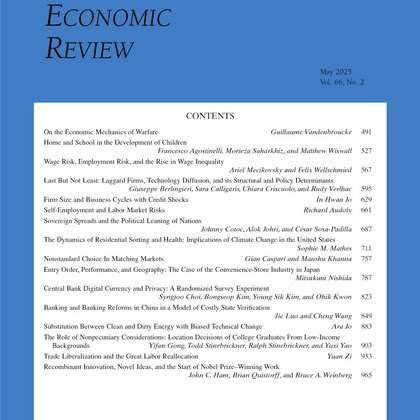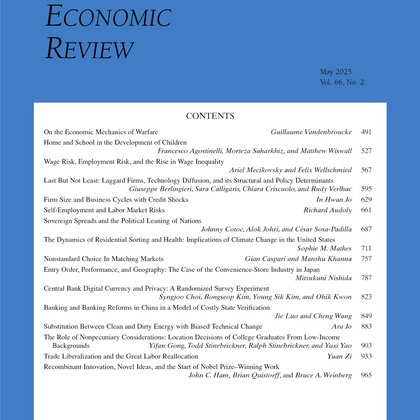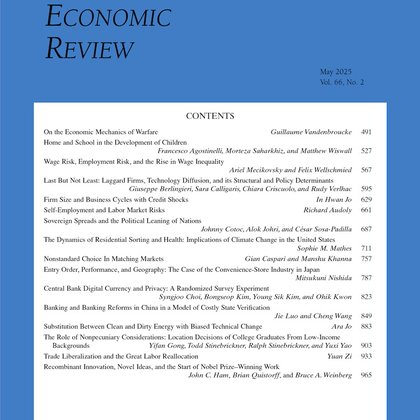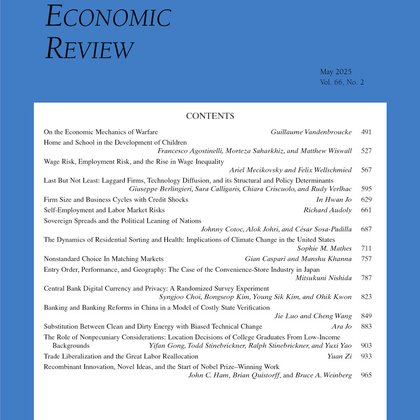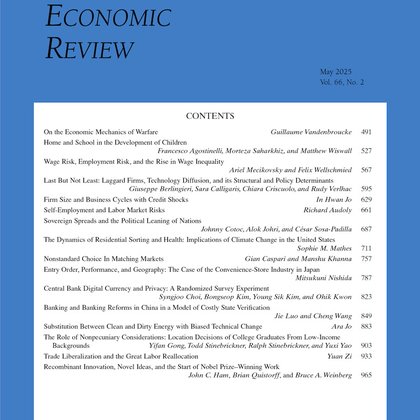
Dirk Krueger
@IERJournal
Followers
4K
Following
3
Media
0
Statuses
369
Twitter account of the International Economic Review
Philadelphia, PA; Osaka, Japan
Joined March 2022
The International Economic Review has just published a new exciting paper by Evangelos Dioikitopoulos & Dimitrios Varvarigos on Material Aspirations, Cultural Change, and the Transition Toward Sustained Growth. It is available through @WileyEconomics here:
onlinelibrary.wiley.com
We highlight the role of economic materialism as a cultural phenomenon of significance in relation to economic transformation and development. By inducing material aspirations, an endogenous cultur...
1
2
10
The International Economic Review has just published a new exciting paper by Randolph Sloof, Roel Beetsma and Alina Steinweg on Debt Ceilings With Fiscal Intransparency and Imperfect Electoral Accountability. It is available through @WileyEconomics here:
onlinelibrary.wiley.com
We study optimal debt ceilings in a political-agency model with uncertainty about both policymaker type (benevolent or selfish) and economic state (good or bad). Elections generate disciplining and...
1
4
15
The International Economic Review has just published a new exciting paper by Minsu Chang and Chunzan Wu on When in Doubt, Tax More Progressively? Uncertainty and Progressive Income Taxation. It is available through @WileyEconomics here:
onlinelibrary.wiley.com
We study the optimal income tax problem under parameter uncertainty about household preferences and wage dynamics. We derive conditions characterizing how such uncertainty affects optimal tax...
1
7
20
The International Economic Review has just published a new exciting paper by Dan Su on The Capital Matthew Effect: Directed Technical Change and International Capital Flows. It is available through @WileyEconomics here:
onlinelibrary.wiley.com
This study shows that technological specialization is one plausible driver of long-term international capital flows. Capital scarcity raises marginal returns but also steers countries toward capita...
1
0
2
The International Economic Review has just published a new exciting paper by Maurizio Malpede on The Dark Side of Batteries: Cobalt Mining and Children's Education in Sub-Saharan Africa. It is available through @WileyEconomics here:
onlinelibrary.wiley.com
Although extractive industries have been associated with women's empowerment and lower infant mortality in Africa, this article provides evidence that the rapid increase in the demand for lithium-i...
1
5
16
The International Economic Review has just published a new exciting paper by Nan Li, Chris Papageorgiou, Tong Xu and Tao Zha on Policy Contagion: What Do We Learn From Financial Reforms?. It is available through @WileyEconomics here:
onlinelibrary.wiley.com
We use financial reforms as a case study to understand the temporal clustering of policy changes across countries, shedding light on the broader phenomenon of global policy contagion. We construct a...
1
0
16
The International Economic Review has just published a new exciting paper by John Duffy and Andreas Orland on Liquidity Constraints, Income Variance, and Buffer Stock Savings: Experimental Evidence. It is available through @WileyEconomics here:
onlinelibrary.wiley.com
We test the buffer stock model of savings behavior using a three-period intertemporal model. In one treatment, liquidity in the second period is constrained (borrowing not possible), while the...
1
1
4
The International Economic Review has just published a new exciting paper by Niccolò Urbinati and Marco LiCalzi on Market Allocations Under Conflation of Goods. It is available through @WileyEconomics here:
onlinelibrary.wiley.com
We study competitive equilibria in exchange economies when a continuum of goods is conflated into a finite set of commodities. The design of conflation choices affects the allocation of scarce...
1
0
2
The International Economic Review has just published a new exciting paper by Jianjun Miao, Zhouxiang Shen and Dongling Su on Inflation and Debt Rollover Under Low Interest Rates. It is available through @WileyEconomics here:
onlinelibrary.wiley.com
We provide a New Keynesian model with overlapping generations to study the impact of temporary and permanent increases in fiscal deficits financed by debt rollover policy when interest rates are...
2
6
22


